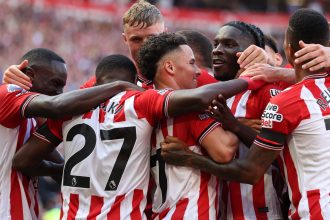GOAL sat down with the former Italy star to discuss his new path, why it means so much to him and how his prior experiences got him here
Giuseppe Rossi’s story is, on the surface, about soccer. But more than anything, it’s a story about home.
Home is a complicated thing. Sometimes it’s where you’re born. Sometimes it’s something you find. Sometimes it’s something you earn. And sometimes, it’s more than one place pulling at you at once. They all matter. Some matter more at different points in life, and those points shift. But home is home – and that doesn’t change.
For years, Rossi's soccer allegiances embodied that push and pull. Born in New Jersey, he famously chose to represent Italy, his family’s homeland, at the international level. Over time, Italy became his homeland, too. His proudest moments came in an shirt – one that, he admits, still feels heavier than he can explain.
Italy was the home he chose – or, as he puts it, the one he was born into. In truth, it never felt like a choice. His commitment to Italy was rooted in pasta nights, Serie A weekends, and childhood fairytales of Roberto Baggio. Those memories shaped him, and they still do. He's the American-born son of Italian immigrants who, like so many, felt the tension of dual identities – and the pride in both.
"For me, home is family," Rossi told GOAL. "I was lucky enough to travel the world and live in beautiful places in Spain and Italy. Being Italian, moving to Italy when I was 12 allowed me to learn about the culture more when I was a kid. I also understand my childhood was a certain way growing up with the way we were brought up in America, with those Italian traditions, which were just like being back in Italy. For me, though, home is where family is, and this is where we've established ourselves."
On Tuesday, North Jersey Pro Soccer – set to begin play in USL League One in 2026 – announced that Rossi – the 30-cap Italian international who starred for Manchester United, Villarreal, and Fiorentina – has joined as the club's vice chairman and head of soccer. He’s not just an investor, he’s a hands-on architect. Now 25 years after leaving North Jersey to chase a dream in Europe, Rossi is home again – with purpose.
With his playing days behind him, his next chapter is once again defined by one of life’s most powerful forces: love for where you came from.
"I don't have to do this. I'm lucky enough that I could be stuffing my face with pasta every single day somewhere. I chose this because it's dear to my heart," Rossi said. "I want to see the game grow in the right way. I want to grow the game in my little garden, my home, which is in this North Jersey area. At the end of the day, if your heart is in the right place, then the rest will follow, right?"
At his core, Rossi has always followed his heart. It took him across Europe, to the highest levels of the game. It pulled him through dark moments – the kind that would leave many questioning everything. But not Rossi. His journey was never in doubt. Neither is what comes next.
All these years later, he's back in North Jersey. And now, with perspective and experience, he has a vision for what should come next – for both himself and the game in his home community.
In an exclusive conversation with GOAL, Rossi reflected on his career, the what-ifs, and his decision to return to the sport through USL – and through home.
Getty ImagesAddressing the 'what-ifs'
For many who follow American soccer, Rossi is the biggest 'what-if' there is. At his peak, he was one of the best forwards, starring for teams like Villarreal and Fiorentina in Europe, and the U.S. national team has long struggled to fill that position. In general, the U.S. haven't lost many dual-nationals to other national teams, and over the course of the last few decades, many players with multiple allegiances have become part of the lifeblood of American soccer. The U.S. is a country of immigrants, after all, and the national team often encapsulates that fact.
The truth is, though, that there never was a 'what-if' for Rossi, largely because there was never a decision to be made.
"I understand where they came from in America, trying to get a young player to play, but there was never really a part of me that said, 'Okay, I have to choose' because my choice was already made since I was a kid," Rossi said. "When I talk about being a kid, I mean seven or eight years old, watching the World Cup and the Italian national team play. My father took me to watch the Italian national team play against Ireland, and that's a memory I'll cherish forever. Waking up every Sunday at 9 a.m., throwing on my Milan jersey and watching Milan play, that was something that was built into me as a kid. So, when I did have a decision to make, it wasn't a decision. I knew what I wanted since Day 1. I never hesitated and never wanted anything different."
There were approaches. Rossi spent the latter parts of his childhood overseas, establishing himself as a youth international with Italy's U-16s, U-17s, U-18s and U-20s. When he was with the Italy U-21s at just 18 years old, the USMNT reached out, offering Rossi a path towards the 2006 World Cup. He can admit now that he was never tempted. His heart just wasn't in it.
"I could have taken the easy way and gone with the U.S. national team," he admitted. "I would have made a lot more money with sponsorship deals, now that I think about it! Like I said, though, that was never part of my thinking. I follow my heart, not my pockets, and therefore it was one of the best decisions I ever made because I was able to represent my family, my culture, all of the Italian-Americans in Jersey and around the U.S."
To understand why Rossi felt that way, you have to understand his upbringing while growing up as an Italian-American in New Jersey.
AdvertisementGetty'It was worth everything'
Generally, Rossi says, people understand. There's some criticism on social media, for sure, and there always will be, but Rossi believes that most in America can understand why he felt compelled to represent Italy. For many, it's a decision they'll never have to make, a decision to choose between two sides of yourself. That's what Rossi, and other dual nationals, are asked to do.
In one moment, though, Rossi knew it was all worth it. That moment came on Oct. 11, 2008, the day he made his senior national team debut. He'd already played for Italy at the 2008 Olympics, winning the Golden Boot in the process, but on that October day, Rossi, just 21 years old, achieved the dream. Afterward, he saw the looks on his parents' faces. Pride, he remembered, and what's better than making your parents proud?
"It was worth all the criticism," he said. "It was worth the hard work. It was worth everything. Anything that makes your parents proud is always going to be worth the sacrifice, and that's not even the national team but my whole career. That moment was something that my father, more than anything, the proudest human on earth. My father was a soccer junkie. He loves the game and he lived his dream through me. I felt like I had to continue this dream of ours, not mine, ours, and I always put pressure on myself to make sure that we did it together in the right way."
That moment wasn't just about Rossi's birth family, but the family he chose back in North Jersey. In the years since he made his decision, Rossi says he frequently talks to other Italian-Americans about his career. He achieved the dream of many, and he can now understand that fact. For a while there, the Italian national team featured an Italian-American. For those in communities in New Jersey or wherever else in the U.S., there was something special about seeing one of them representing their community at that level.
Being Italian-American defines him. He's not Italian or American; he's both. Growing up in North Jersey, both were celebrated in equal measure. Through both identities, he became who he is now. It's a similar story for many.
"There's a big Italian community, and you felt that growing up," he recalled. "I felt and still feel very proud of our Pasta Sundays, our Pizza Fridays, the different traditions we were able to keep here in Jersey with our Italian community. It was very important for me, and for my mother and father, who came here when they were 15-16 years old and established themselves in North Jersey. I feel a part of this New Jersey culture and, at the end of the day, there's a big community of Italians here. If my parents had moved to Idaho, I don't think we would have felt as accepted. Having that acceptance here in Jersey, that's why we wanted to stay here and that's why we call it home.
He added, "All of America, we're sons of immigrants, right? Jersey may be moreso, especially with the European and South American influences. The first step, for anyone coming here back in the day, was always New York or New Jersey. That plays a huge part. That's why so many kids love to play, and that's why you find so many good players in Jersey."
Rossi is one of those players, many of whom have gone on to represent the USMNT. There is more to be found, though, and more that could use guidance from someone who lived it. That's why Rossi's back. That's his next chapter.
Getty ImagesThe changing landscape in American youth soccer
Rossi can admit it: there are aspects of the modern game he doesn't recognize. It feels so foreign to him now, particularly a few years into his retirement.
In the end, Rossi spent 21 years as a professional, playing across four different countries while representing Italy at two major tournaments. Some of his dreams, unfortunately, were dashed due to a series of injuries. Those injuries, in many ways, defined his career. He never got to the World Cup because of them. That's not to say that, during his peak, Rossi wasn't a star, though. During a four years span at Villarreal, he scored 77 goals. During that time, he made 27 of his 30 appearances for Italy.
Because of those experiences, Rossi feels particularly qualified to speak on the highs and lows of professional soccer, having lived them in four different countries. He can also acknowledge that the sport now lives in a different world than the one that existed when he was coming up.
"Today, I feel like it's parents more than anything telling these kids that they have to decide something at 13, 14, 15 years old," he said. "It's ridiculous, absurd. They do that so they can have a status. Who gives a crap? Who cares where they're playing national team soccer at 13, 14, 15 years old? It doesn't mean anything. It's just a status for parents so they can talk about their kids and say this and that. It's not developing players. It's putting extra pressure and it's taking away from what the true focus should be: developing and having the right coaches to develop.
"I don't care what national team you play for. I don't care what club you play for. It doesn't matter. Continue to develop, continue to have the right people around you and then these things will happen for you."
With North Jersey Pro Soccer, Rossi feels like he has a chance to make an impact in the very same community that he has always felt a part of. He grew up on these fields, first finding his love for the game. Due to his Italian passport, though, he had different opportunities than most kids ever would have. There are countless kids in New Jersey who could make it if they had the resources. There are also countless kids in New Jersey that may never make it, but love soccer enough to try. How do you serve them? What can those in charge do to help them? Giving them opportunities and options is the answer.
"The top of my list was always getting Giuseppe involved," says club co-founder and CEO Erik Stover, who previously was in charge of both the New York Red Bulls and New York Cosmos. "He's the personification of when potential meets opportunity. He had the means to get to Europe at a young age, but many kids like him, from Clifton, from Paterson, from Wayne, they simply don't have that opportunity. Giuseppe lived it. He got to the highest level, and now he wants to be on the pitch with kids who are just like he was. He loves the game, and that love is what we need to bring to the club.
"A lot of athletes do this stuff, and it's all ego-driven. They're not rolling up their sleeves. It's 'Let's show up to a game occasionally and hang out in a suite,' and that's the extent of their involvement. This is the opposite for him. He wants to be intentional, he wants to learn but, more than anything, he wants to help."
Through his role with this new club, which will include both men's and women's sides, that's what Rossi intends to do. Stover says that the pressure won't solely be on Rossi's shoulders, largely because it will take a team to build this club out. The goal is to assemble a talented group of people with a passion for this project. Rossi is one of those people. Through his connections and experience, Rossi will help define the vision of the club, both on and off the field.
When it all does come together, the club will play in the recently redeveloped Hinchliffe Stadium in Paterson, New Jersey. The stadium, once the home of Negro League baseball games, will now be home to a soccer team that Rossi believes can make an impact on not just a community, but his community.
"The problem," Rossi said, "is that, at a certain age, it becomes, 'What do we do with these talents?' That's what we're trying to change with this team in North Jersey. We want to give these kids a place to further their dreams. There are so many kids that care so much about the game and we're just wasting it. We don't want to waste things anymore."
Getty Images SportMaking an impact in a new chapter
Soccer very much remains the focal point of Rossi's life. It's changed, of course, but the love remains.
In March, Rossi played in his own farewell match in Florence as part of a celebration known as "Pepito Day", alluding to Rossi's famous nickname in Italy. In front of thousands of fans, surrounded by legends like Gabriel Batistuta, Daniele De Rossi, Mario Gomez, and Luca Toni, Rossi said goodbye to that aspect of his life. A new one is beginning.
"I would hear stories growing up about my friends and the question always was, 'Where do I send kids to get a good soccer education?' That has always bothered me," Rossi said. "As the years have gone by, youth soccer has grown, but the intentions really haven't been there for the kids. It's never putting the kids first, always pockets first. That's something that bothered me from Day 1.
"Now, being retired, I have this opportunity to build something in my backyard. I wanted to find a way for me to be part of this and, in a sense, give back to the community I grew up in. After 20 years at the pro level, being blessed enough to have played with and be coached by the best, all of that knowledge is coming back with me. What is that knowledge for if you can't give it back?"
What comes of it is anyone's guess. The American soccer landscape is famously chaotic, something Rossi knows all too well. The culture, too, is constantly changing. It's gotten better since Rossi left New Jersey all those years ago, but it's still being built from the ground up.
"The biggest difference between American and European players is that, in America, this is a hobby and people play. In Europe, it's life. It's literally in their blood," he said. "If you have both and you put them together, you see the difference. How can we make it here so that the game isn't just a hobby, but something that takes over people's lives in a healthy way? That means people's thoughts and efforts are going towards this. During the two hours that you're part of this, you're fully dedicated to trying to get to your next level, whatever your next level is."
Rossi is at his next level and, for it, he's chosen to go back to the beginning. He will always have a home in Italy. There will always be supporters who remember him. There will always be teammates and friends to reconnect with, ones who helped him get through the good and the bad. The pull of Italy will always be there, just as it always has been.
Right now, though, the pull of New Jersey is just a little bit stronger. Rossi feels he has work to do. He feels he has a community to serve after so many years of that community helping him become the best he could possibly be.
"I'm very proud of what I did, the person that I became thanks to the people who have been around me since Day 1," he says. "I'm very, very happy living this life and doing what I can now do today."






